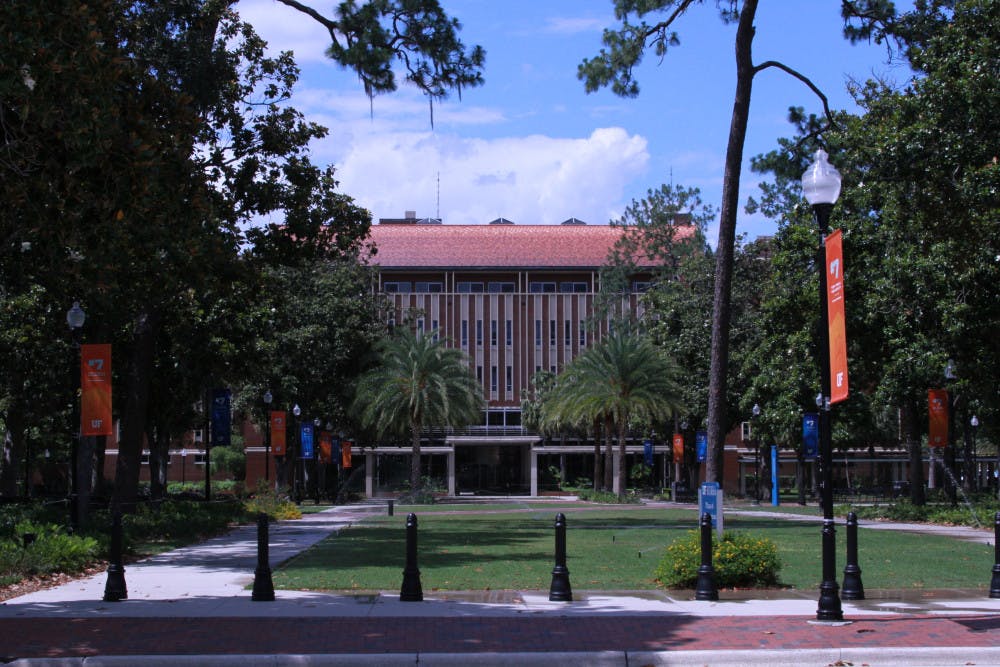Before stay-at-home orders were issued to prevent the spread of COVID-19, 21-year-old UF music education senior Joe Leites could be found tucked away in a cubby desk at the Architecture and Fine Arts Library.
But after UF President Kent Fuchs announced in March the campus would close to prevent the spread of COVID-19, including the libraries, Leites had to return to his hometown, St. Augustine, and find somewhere new to study. At home, he found himself grappling with whether to shoot hoops on NBA2K or complete discussion posts for Social Foundations of Education––his Xbox usually took the dub.
Leites and other UF students will have the opportunity to return to their usual library study spaces at the end of this summer, although Leites’ new battle might be finding a spot to work.
All six UF libraries are scheduled to reopen Aug. 28 at 25 percent capacity, said Barbara Hood, the George A. Smathers Libraries’ Director of Communications. The capacity will be determined by counting the number of seats available after moving each seat six feet apart, according to Patrick Reakes, the George A. Smathers Libraries’ Senior Associate Dean.
There will be about 4,000 fewer seats available in Fall, a drop from about 5,300 spots in Spring to about 1,300 in Fall, according to calculations using seating information Reakes provided The Alligator.
Visitors will be required to present a Gator 1 card to enter, wear a mask and social distance, Hood said. The reopenings are part of a plan Fuchs announced in May.
Students will be told to study by themselves, use every other computer and group study rooms will be closed, Reakes said. Library staff will also work to enforce social distancing by reminding students to keep a six-foot distance, he said.
“We’re not going to jam thousands of people into our libraries and go against UF protocols,” Reakes said.
The deadline for past-due books has been extended to Sept. 4 because students returning to campus should be back by then, Reakes said. Students who do not return their books by the deadline can contact a UF librarian to create a plan of action catered to their situation.
All libraries except for Library West, which is one of two 24-hour spaces on campus, will resume their usual hours from prior to COVID-19 closures, Reakes said. Marston Science Library and Library West will be open from 8 a.m. to 1 a.m. on Monday through Thursday, 8 a.m. to 6 p.m. Saturday and 10 a.m. to 1 a.m. Sunday.
The Education Library, Smathers Library and Architecture and Fine Arts Library will operate from about 8 a.m. to 10 p.m. Monday through Thursday, with reduced hours on the weekend.
The hours for the Health Science Center Library, which was the university’s other 24-hour library, are still being determined, Melissa Rethlefsen, the Associate Dean and Fackler Director of Health Science Center Libraries, wrote in an email to The Alligator.
Students will have access to a doorside pick-up service starting July 6 outside of Library West, Reakes said. Students will be able to request books through the Library Catalog and pick them up Monday, Wednesday and Friday from 9 a.m. to 3 p.m., he said.
Students who don’t feel comfortable coming into the facilities in Fall or aren’t allowed in because of limited seating can use the libraries’ online resources including Ask-A-Librarian, virtual chat service to contact librarians, and the library catalog, the libraries’ database for online academic journals and books. Students can access them using the UF Virtual Private Network or the UF Proxy Server, Reakes said.
The second floor of the Health Science Center Library reopened in May to students enrolled in the six Health Science Center colleges because they had returned to campus to complete their clinical rotations, Rethlefsen wrote. It is the only UF library currently open as of May.
All library staff members will return to their jobs throughout July and early August after being tested for COVID-19 following the university’s Screen, Test and Protect program, Reakes said.
Before stay-at-home orders, university custodians would focus on surface counters, but following the university’s drafted plan, staff will now focus on touch points such as doorknobs, light switches and elevator buttons to prevent the spread of COVID-19, said Larry Ellis, UF Director of Building Services.
The estimated drop in capacity in Fall would make Leites’s main study spot, the Architecture and Fine Arts Library, fall from having about 120 available seats to only 30.
Leites said that while he knows these policies aim to prevent the spread of COVID-19, it will still force him to change his routine and find another quiet location to study at, like Panera Bread or Starbucks, after three years of using the libraries.
“It’s a little frustrating because I’ll still be looking for somewhere to study that’s not my apartment,” he said. “But I have to understand and work with that.”
Contact Diane at dhernandez@alligator.org. Follow her on Twitter @dianehern19.
All libraries except for Library West, which is one of two 24-hour spaces on campus, will resume their usual hours from prior to COVID-19 closures upon reopening in August.






